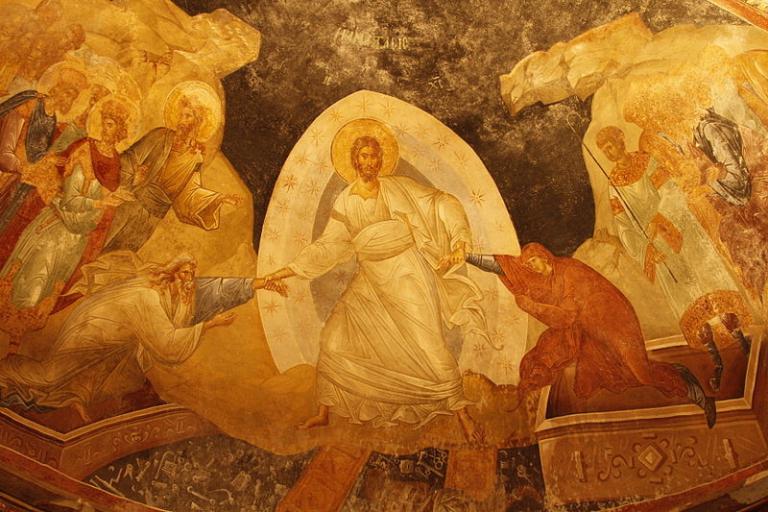
A fresco painting in Istanbul’s medieval Chora Church depicts Christ standing upon the smashed doors of the Underworld, retrieving Adam and Eve from their long bondage there.
(Wikimedia Commons public domain image)
Responding in a friendly and positive way to some comments that I recently made here about the importance of scriptural historicity, Tom Hobson, a Presbyterian pastor, kindly called my attention to a series of three relevant and thoughtful articles that he published in The Presbyterian Outlook back in 2009. In turn, having read them, I’m happy to bring them to the notice of those who follow this blog:
“Historicity: Does it matter?”
“Historicity: Does it matter? Part 2”
“Historicity: Does it matter? Part 3”
I think it obvious and undeniable that the historicity (or lack thereof) of certain events narrated in scripture matters very, very much, though not everything is of equal importance. For example, I can think of no major principle of my faith that would be compromised were it to be found that the book of Job is fictional:
“There was a man in the land of Uz whose name was Job, and that man was blameless and upright, one who feared God and turned away from evil” (Job 1:1 ESV).
This isn’t quite “Once upon a time” or “A long time ago in a galaxy far, far away,” but it’s curiously vague. We learn nothing about the specific town in which Job lived, nor about his lineage. Was he a Hebrew, an Israelite? A pagan? When did he live? We aren’t told. We can’t even determine where “the land of Uz” might have been located.
And are we really to believe that Satan mingles freely in heaven with “the sons of God” and places bets with the Supreme Being about whether this or that mortal will remain faithful even if subjected to exceptional stress as part of the wager?
The most eloquent passages and fundamental truths expressed in the book of Job will remain intact even if we conclude that it’s more like the plainly fictitious New Testament parables of Jesus than like a modern academic biography.
Of course, things are very different where Jesus is concerned.
During the four years that my wife and I lived in Cairo, we counted among our friends an American Lutheran minister who pastored the non-denominational expatriate chapel near our apartment. I’m quite confident that he was a serious believer. But it would have been difficult to prove that from his Easter sermons, which we attended annually. In those sermons — at least, as I remember them — there were many references to the return of spring, with its beautiful sunny weather and its lovely flowers, but the resurrection of Jesus was conspicuous by its absence.
I think that he perhaps didn’t want to offend some in his very disparate congregation, but I always felt empty at the end of his remarks. To me, on that most important of all Christian holidays, there was little that was distinctively Christian in his message. Pretty flowers and clear blue skies are very, very nice, but “if in this life only we have hope in Christ, we are of all men most miserable” (1 Corinthians 15:19).











